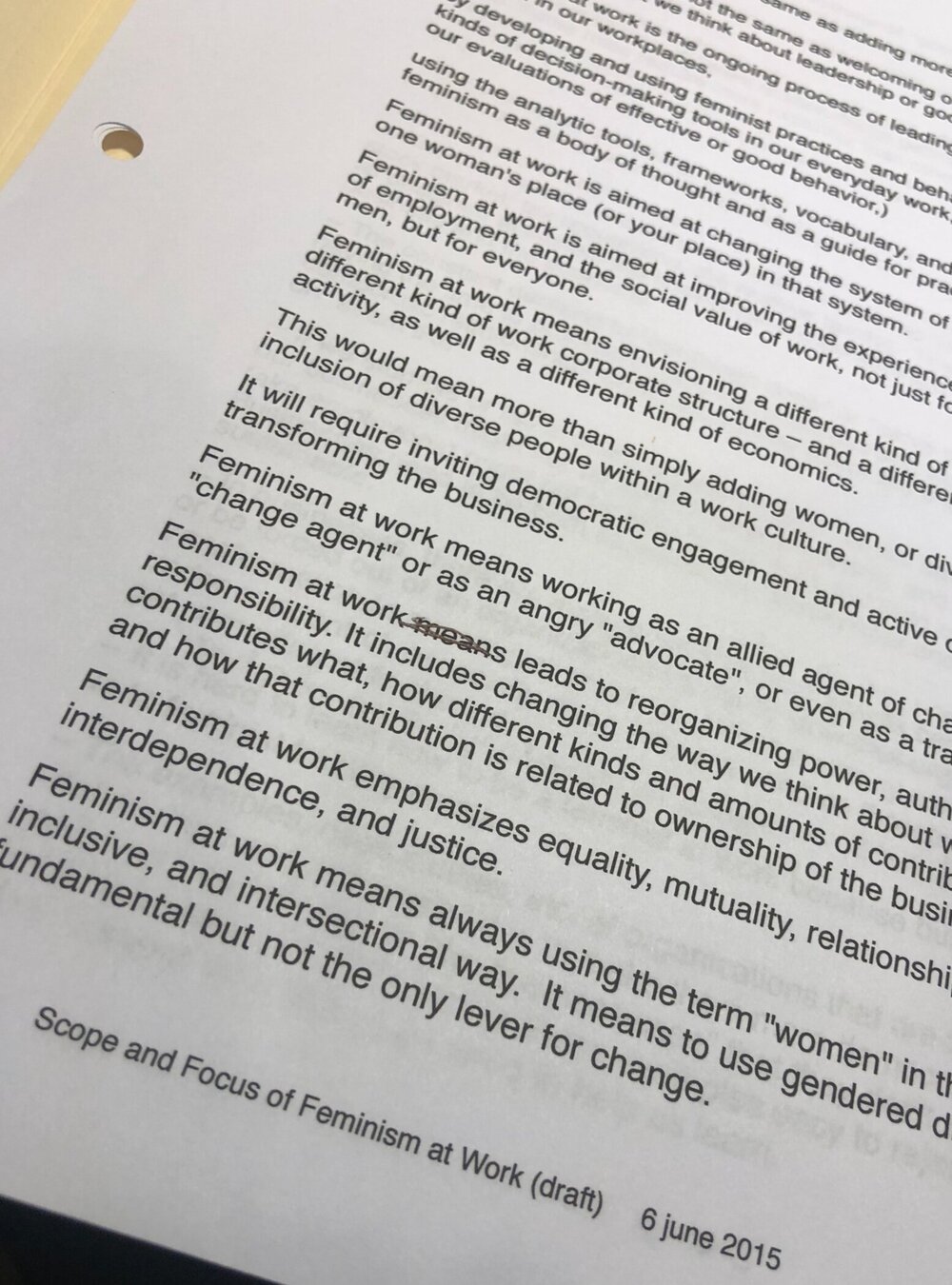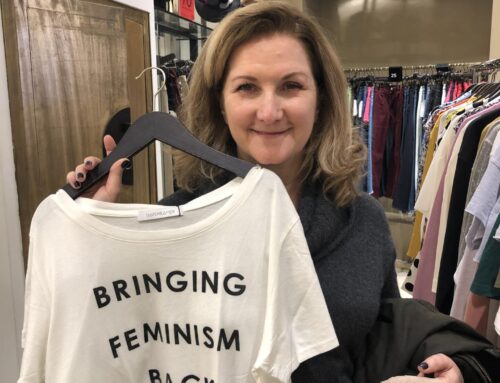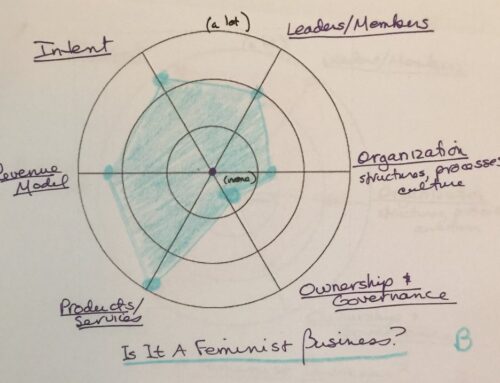More notes, from 6 June 2015!
What is Feminism at Work?
-
Feminism at work is not the same as adding more “women in business”.
-
Feminism at work is not the same as welcoming or including “feminine” traits into the ways that we think about leadership or good management.
-
Feminism at work is the ongoing process of leading together to change the systems in our workplaces,
-
by developing and using feminist business practices and behaviors by transforming conventional business practices so that they reflect feminist values (e.g., using different kinds of decision-making tools in our everyday work, applying different norms to our evaluations of effective or good behavior)
-
using the analytic tools, frameworks, vocabulary, and history of intersectional feminism as a body of thought and as a guide for practice.
-
-
Feminism at work is aimed at changing the system of work, not just advancing one woman’s place (or your place) in that system.
-
Feminism at work is aimed at improving the experience of work, the experience of employment, and the social value of work, not just for your kind of women or men, but for everyone.
-
Feminism at work means envisioning a different kind of organization – a different kind of work structure – and a different kind of business activity, as well as a different kind of economics.
-
This would mean going beyond simply adding women, or diversity, or increasing the range of people representing different social cultures within a work culture.
It will require inviting democratic engagement and active collective leadership in transforming the business.
-
-
Feminism at work, for an individual, means working as an allied agent of change, not as a lone “change agent” or as an angry “advocate”, or even as a traditional “leader”.
-
Feminism at work means leads to reorganizing power, authority, and responsibility. It includes changing the way we think about who earns what, who contributes what, how different kinds and amounts of contribution are valued, and how that contribution is related to ownership of the business itself.
-
Feminism at work emphasizes equality, mutuality, relationships, interdependence, and justice.
-
Feminism at work means always using the term “women” in the most complex, inclusive, and intersectional way. It means to use an analysis of gendered power dynamics as a fundamental but not the only lever for change.

The interesting stuff you find when you’re reorganizing your file cabinet!
Feminism, Work, and Power
Feminism at work aims to resolve all forms of oppression that are reflected in work processes, work culture, and work products. (“Oppression” is the unjust allocation and use of systemic and institutionalized power (within the organization, society and the economy). When people exert authority over others through oppression, their use of power is illegitimate. It lacks the consent of those towards whom it is directed as well as those who aim to deploy it.)
It can be hard to address questions of “power” in work organizations, specifically, because:
— Some differences in authority and responsibility within a business remain important and necessary.
For example, owners, shareholders, customers, clients, employees, and stakeholders all have different relationships to getting things done and creating value. Some roles require more expertise than other roles. This expertise should be recognized by the scope and responsibilities of different roles within a business. [note: not everything has to be the same in order for their arrangements to be just and fair.]
— The pressures of making “enough” money to survive and thrive make it hard to question how power and responsibility are currently organized in business.
— A certain form and structure of power is consistently legitimated by large social, commercial, and cultural structures (such as the banking system, the stock market, tax regulations, the nuclear family). These larger structures are all designed to sustain the conventional (non-feminist) understanding of business and the economy.
— The constant demand to “get things done” or “serve customers” makes having the time to process democratic decisions and experiment with more democratic relationships within a business seem like a luxury. (Emphasis here on “seem like”.)
— If we stumble or fail to make a good product as we transform our workplace, our businesses might not be able to meet expenses, and we & our colleagues (aka employees) might not be able to pay rent and feed our families. Businesses need to be both economically sustainable and socially just/sustainable.
— In businesses, there are many ways that participants can exit an organization or be forced out of an organization in order to slow that organization’s transformation to a more just structure. When so many exits are open and not under our control, especially when they are used as threats to keep us from advocating for change – it can be hard to get commitment to change.
— It is hard to learn now to be a feminist at work because businesses don’t send us to feminist training camp.
— The examples, case studies, etc. of organizations that are transforming power relationships and responsibilities to make them more democratic & just often seen seem so far outside “the business case” that they don’t seem to apply to ongoing businesses. This makes these examples easy to reject as irrelevant, when instead they should be used to help us learn.
When feminism is at work in a business, we care about:
— What is produced.
Is this product meaningful? Is the need it fills really important?
— How the product affects us and others.
Does the provision of the product or service serve interdependence and agency, or does it encourage dependency?
Does it treat customers like flawed objects or fully whole human beings?
Does the product add real value? Does it serve an important need?
Does the product help us care for each other?
— How the product is marketed.
What does the product promise? Does this promote health and justice?
What does this product actually deliver, in terms of function and social impact?
— How the product affects the material world.
Does the product itself create waste? Or pollution? Does the process of making the product damage the environment or damaged the relationships of people involved in making?
Feminism at work is concerned with changing how things are made and how services are provided.
This includes not only the ‘efficiency’ of the production system but also the externalities (or impact) of the production process.
Feminism at work is concerned with the division of labor and with work systems within the business. Simple things like scheduling, flexibility, and job design can be reconsidered from a feminist perspective.
Feminism at work is concerned with creating and fairly distributing value, and this with costs, profits, wages, prices, and ownership – anything related to money, who gets it and who earns it.
Feminism at work is concerned with the humanity of “human resources” even while it questions the idea of human beings as resources or as capital that can be exploited by a business to increase profits for owners.
Feminism at work is concerned with how people are hired, trained, promoted, paid, and retired/exiting from the business.
Feminism at work is concerned with how we partner with other businesses, and with other organizations. We think about our partners, our network, our community, our neighborhood, and even our competitors, do we work to have respectful, honest, and mutually beneficial relationships with them?
Feminism at work is concerned with how we treat each other at work. Do we challenge conscious and unconscious bias in our own behavior and in the behavior of others? Do we encourage respectful and caring relationships with each other? Do we recognize and encourage the full humanity of the people with whom we work?
Feminism at work is concerned with how we feel about ourselves when we are at work, and when we are not at work. Does our workplace support our own personal health and well-being? Does it promote our growth? Does it promote positive relationships with our families, and with our larger community?
What can feminist advocates do at work to promote feminist practice in their businesses?
-
We can make feminist leadership development a conscious part of our business building strategy.
-
We can make sure that, over time, all members of our organization or of our business have leadership opportunities and leadership development opportunities.
-
We can create collective (as opposed to individual) models of leadership and leadership structures
-
We can consciously reflect on the relationship between leaders and “followers” so that both groups have active responsibility to each other.
We’ll need to challenge and change our assumptions about women (and men, and all people) so that we can all be more feminist at work.
The assumptions we need to challenge include beliefs:
-
That women will “naturally” know how to do feminist business– even better than men will know. (Note: feminist behavior is not “natural” to women and not “unnatural” to men or people who are not women. Feminist business practice is learned behavior that we can teach and learn with each other.)
-
That we can learn simply by doing and by caring. Instead, we have to recognize that we need structures, time, and facilitation for learning and experimenting.
-
That we are all equally skilled. (And that differences in skill make some people more important people than others.)
-
That we will all find it easy to agree.
-
That we will all understand the feminist vision for the business.
-
That we will all agree with the goal of a feminist business, and of our feminist business in particular.
-
That will be willing to expose ourselves, and be vulnerable, as we try new practices and learn new ways of thinking about what we are doing together at work.
-
That we’ll all be okay with giving up the disproportionate privileges we have, so that everyone is privileged and respected as a member of the community.
-
That we’ll be able to resolve material conflicts fairly, or easily. (e.g., It’s not necessarily easy for me to reduce my 3X salary to a 2x salary, so that you can go from a 1X salary to a 2X salary.)
Related Posts







